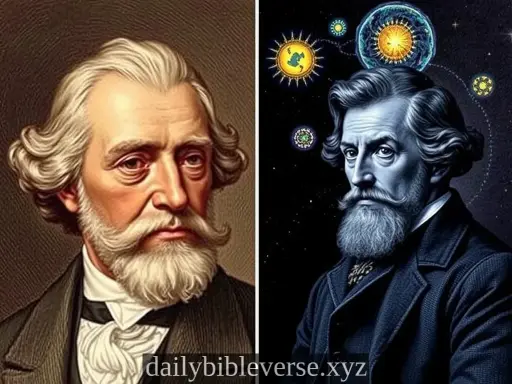Embracing God’s Heart: Lessons from 2 Samuel
Title: Embracing God’s Heart: Lessons from 2 Samuel
2 Samuel 7:18-19 (NIV)
“Then King David went in and sat before the Lord, and he said: ‘Who am I, Sovereign Lord, and what is my family, that you have brought me this far? And as if this were not enough in your sight, Sovereign Lord, you have also spoken about the future of the house of your servant—and this decree, Sovereign Lord, is for a mere human!”
Verse Exploration
In this passage, we witness King David in a moment of profound humility and gratitude.
He recognizes the weight of God’s favor amidst his human limitations.
David contemplates his own insignificance compared to the greatness of the Lord, pondering why God would choose to bless him and his lineage.
This sentiment is all too relatable for many of us facing the challenges and uncertainties of life.
Often we find ourselves questioning our worthiness.
Just as David experienced, we too can find ourselves astonished by the grace and love that envelops us.
In our modern-day struggles, we might feel inadequate in our roles—be it as parents, friends, or leaders.
David’s reflection invites us to recognize our humble position while also acknowledging the immense love God has for us.
It encourages us to embrace our own stories, trusting that they weave into a grand narrative that God is crafting in our lives.
Personal Connection Story Sharing
A few years ago, I found myself at a crossroads in my life.
Having recently lost my job, I was filled with uncertainty and self-doubt.
I often pondered, “Who am I that I could bounce back from this setback?”
In my moments of despair, I turned to scriptures, finding solace in passages like 2 Samuel 7.
Just as David approached God with humility, I, too, sought divine guidance.
One evening, I sat in silence, lifting my concerns to the Lord.
That night, I truly felt His presence, akin to how David felt before the Ark of the Covenant.
God’s voice whispered that my value was not determined by my job but by my inherent worth as His creation.
As I grasped this truth, clarity began to wash over me.
Eventually, I utilized this tumultuous time to venture into a new career path that aligned with my passions.
Reflecting on David’s acknowledgment of divine favor aided me in understanding that God still had plans for my life, despite my current circumstances.
This narrative from David’s life offered me assurance during stormy times, a reminder that God’s promises remain steadfast.
Historical Context
To fully comprehend 2 Samuel 7, it’s important to acknowledge its historical background.
This chapter unfolds during a critical time for the Israelites, who had transitioned from the period of judges to united monarchy under David’s leadership.
After years of battles, David had successfully established a strong kingdom.
Nonetheless, the nation faced numerous internal and external challenges, including the remnants of opposition and the complexities of governance.
In this context, God’s covenant with David becomes pivotal.
The promise God made, that David’s lineage would endure forever, carries profound implications for the Jewish faith and ultimately sets the stage for the coming of Jesus Christ.
It signifies a shift from temporary earthly victories to the establishment of an everlasting kingdom.
Today, parallels can be drawn between the turbulence that Israel faced and contemporary societal conflicts.
As we navigate our lives with an understanding of our own foundations and legacies, we can draw strength from the recognition of God’s promises.
Both in ancient and modern contexts, the assurance of a faithful God provides hope in what often seems like chaos.
Thematic Elements
Several key themes emerge from the scripture in 2 Samuel 7.
These include the themes of grace, divine sovereignty, and legacy.
God’s unexpected grace manifests prominently as He chooses David, not for his accomplishments, but because of his heart for God.
This highlights the profound truth that God sees beyond our failures and successes.
In every era, we grapple with the desire to leave a meaningful legacy.
In David’s case, establishing a lineage that honors God is echoed in our aspirations toward generations after us.
Whether through parenting, mentoring, or simply the way we engage with others, we are all contributors to a legacy.
Furthermore, divine sovereignty interweaves through the narrative, emphasizing that while our paths may meander, God’s plan is ultimately unshakable.
In contemporary life, believing in God’s higher purpose encourages us to trust in His timing and promises, particularly during our trials.
Through the lens of 2 Samuel 7, we can find strength to align our aspirations with His eternal truths in our daily walk.
Literary Analysis
The literary style of 2 Samuel is marked by rich imagery and emotional depth.
David’s heartfelt conversation with God exemplifies a personal relationship that resonates throughout biblical texts.
The imagery of David entering God’s presence signifies a moment of vulnerability and reverence, akin to kneeling at the altar in prayer.
This metaphor reflects the importance of approaching God with an open heart, laying our worries before Him much like David did.
David’s inquiry, “Who am I?” is a poignant metaphor for many readers today.
It captures the universal struggle with identity and self-worth amidst external pressures.
Thus, the narrative serves as a reminder that vulnerability can lead to spiritual growth.
Moreover, metaphorical language throughout the chapter enhances the message of God’s everlasting covenant with David’s lineage.
This literary technique invites readers to ponder their own stories and their place in God’s grand narrative.
In recognizing this, we may approach God’s Word with fresh eyes, eager to discover the richness of our own spiritual journeys.
Related Scriptures
-
Verse Text: James 4:10 – “Humble yourselves before the Lord, and he will lift you up.”
Connection: This verse echoes the sentiment of David’s humility in God’s presence.
Relevance: Emphasizing the importance of humility reinforces that God’s grace is most palpable in moments of surrender.
-
Verse Text: Jeremiah 29:11 – “For I know the plans I have for you,” declares the Lord, “plans to prosper you and not to harm you, plans to give you hope and a future.”
Connection: Both passages underscore God’s foresight and loving intentions for His people.
Relevance: In times of uncertainty, this verse provides immense comfort, reminding us of God’s ultimate purpose in our lives.
-
Verse Text: 1 Peter 2:9 – “But you are a chosen people, a royal priesthood, a holy nation, God’s special possession…”
Connection: This scripture reflects God’s choice of David and extends it to all believers.
Relevance: Acknowledging our identity as chosen vessels can empower us to move boldly through life’s challenges.
Practical Application
To put the lessons from 2 Samuel chapters into action, consider the following steps:
- Daily Reflection: Spend a few minutes each day identifying areas of inadequacy and surrendering them to God in prayer.
- Journaling: Write about a time you experienced unexpected grace—recall the moments that shaped your understanding of God’s love.
- Community Engagement: Create a discussion group exploring how God’s promises resonate in your lives.
- Prayer Practices: Develop a list of prayers that reflect gratitude for God’s ongoing faithfulness.
- Service Opportunities: Volunteer in your community to demonstrate God’s love to those around you.
- Mindful Moments: During moments of stress, engage in deep breathing and ground yourself in God’s promises.
- Gratitude Sharing: Regularly share with friends one way you have seen God’s grace manifest in your life.
Encouragement and Hope
You may feel unworthy or face moments of self-doubt, much like David did when confronting God.
Remember that God’s love isn’t contingent upon your actions or achievements.
His grace wraps around you, inviting you to freely share your burdens with Him.
Just as David’s relationship with God exemplifies, vulnerability and honesty resonate with divine love.
Trust that your life, woven with purpose and called to action, is a masterpiece unfinished.
Let the lessons from 2 Samuel encourage you to embrace your journey, knowing God directs each step towards hope and promise.
Engagement Activity
Try this reflective exercise:
Reflect on a specific challenge you’ve faced recently.
Journal about how God’s faithfulness has unfolded in that situation.
Consider sharing your reflections with a trusted friend or group for added support and insight.
By engaging openly with your struggles, you cultivate deeper connections and spiritual growth.
Closing Prayer
Heavenly Father, thank you for your love and grace that surround us daily.
Help us to recognize our worth in Your eyes and guide us as we embrace your promises.
May we find peace in Your sovereignty and encouragement in the legacy we create.
Amen.






